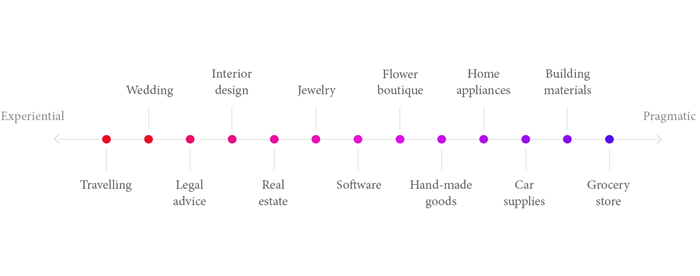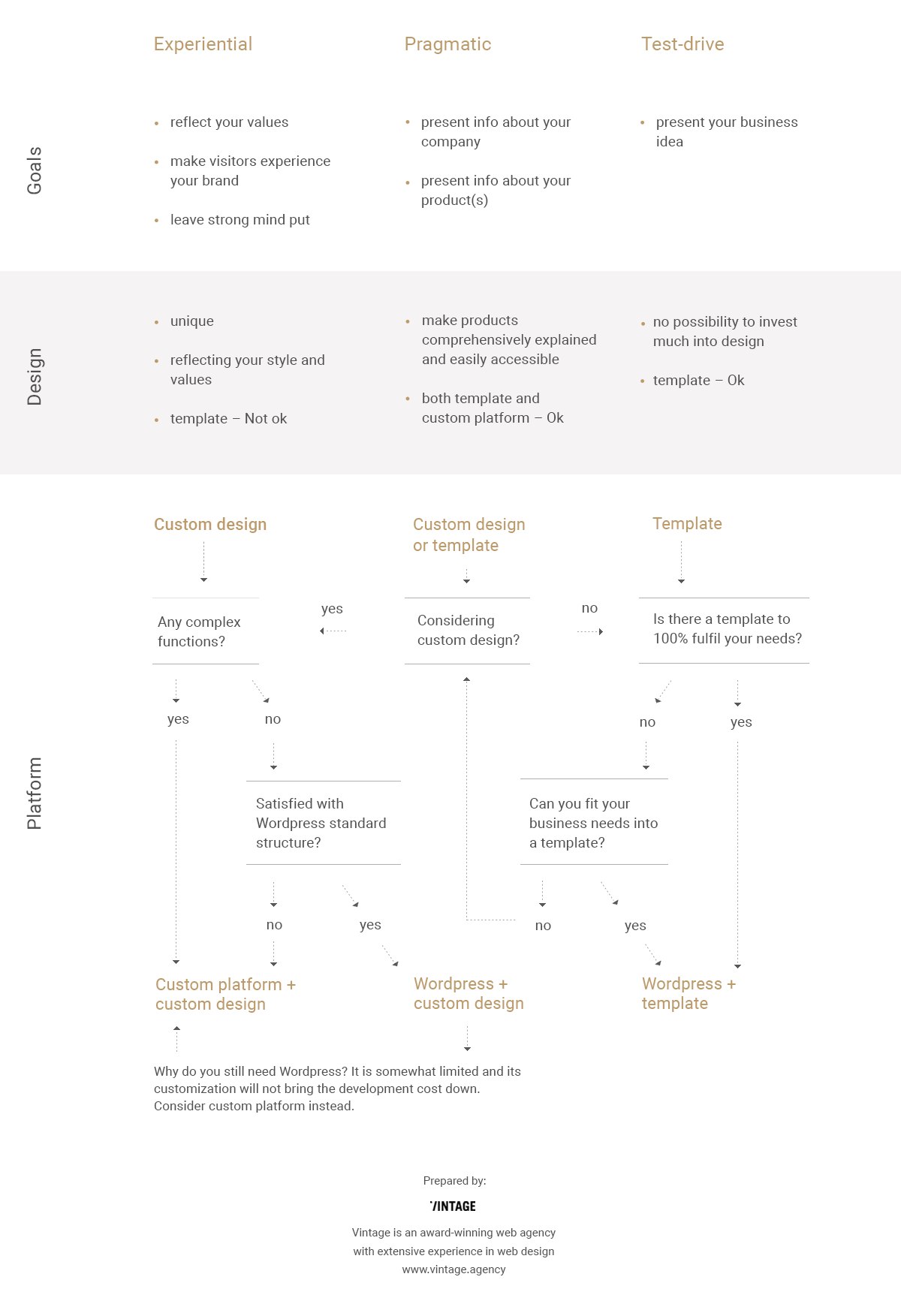When you wish to launch a website for your small business, the first thing that probably comes to your mind would be doing an online search. And with that search, you would get a thousand and one offers for a “quick, cheap, and easy-to-manage” website. Not having a solid web design background, you may get the impression that a good website is really a finger snap away. But that impression would be miles away from how things actually work.
With this article, we continue our series of publications on web design for small business, where we aim to provide a comprehensive guide for small business owners on how to successfully build a worthy website that would multiply their profits.
Today, we are going talk about how to choose the best CMS for your small business website, depending on your budget and business goals.
Goals of your business
Small businesses deal in hundreds of various fields. It is nearly impossible to cover all of them in a single article, so we won’t even try. Instead, we suggest an approach, which will define what client activity you should expect on your website.
There are some common requirements, which every small business would expect their website to fulfill:
- Represent the business (portray the brand, mark the location, showcase product or service, provide contacts);
- Demonstrate reputation (instill visitors with the feeling that the business is worth dealing with);
- Sell online (enable the visitor to make a purchase right from his browsing device; requires an eCommerce platform).
Further on, when we dive deeper into peculiarities of each business, the requirements to the website begin to vary. Here, the question is not “What kind of website do you want?”, but “What kind of website do you want your clients to visit?”. For our convenience, we divided small businesses into three major categories:
Experiential businesses. Such ventures focus on providing services or expertise, rather than selling a particular product. For example, wedding photography, real estate agency, interior design. On such websites, a visitor looks for a qualified and professional assistance, that is why visual looks here are more important than the technical organization.
Pragmatic businesses. Probably, the most common type. Some examples of such businesses are flower boutiques, home appliances, and candy shops. Here, a visitor comes for a particular product and expects to learn all about it. A visual impression of such website would be secondary to the actual informational content. See the infographics explaining the small businesses continuum, below.

‘Test-drive’ businesses. We have put this kind in a separate category. Oftentimes, a new business effort requires testing of the idea itself - you might want to start out with minimal budget before making serious investments. Here, you would need a quick and cheap solution, without much regard to bright design or user convenience, just to see if the idea works out.
For these three kinds of small businesses, a number of website solutions is available. Let us see which one suits what.
Wordpress explained
At this point, you are probably wondering what that “Wordpress”, which keeps showing up in your search results, means.
Wordpress is an open-source platform - a collection of ready-to-use tools, which allows building websites from pre-defined basic elements (blocks). You can compare the Wordpress-based website development experience to assembling an IKEA furniture piece: you have a number of parts, and the list of instructions to put them together.
Wordpress allows working with both templates (page outlines with pre-configured visual elements) and custom designs, where pages are drawn from scratch and then fit into the framework structure - quick and easy.

However, there is a stipulated set of functional features which Wordpress for small business websites can use. Wordpress is a blogging platform, which means that it has everything you need to build a good blog and nothing above that. This is the main strength and, at the same time, the major flaw of Wordpress.
Typically, your CMS company website would be able to have such sections and elements as About us, Blog and Product / Portfolio, but if you need to integrate something more complex, for example, point score system, uploading of user-generated content, or even add some additional fields to your blog posts, like the date of the last edit, the framework will require extensive tuning. And such tuning often accounts for even more budget than building a custom platform from scratch.
What are the options?
Now, after we’ve got what Wordpress is, let us define three approaches to building a website for your small business.
Template Design + Wordpress Platform. This is the most basic thing you can launch on the Internet. You can buy a Wordpress theme for small business wesbite (or you can even get a free one if it suits you), fill it out with your content, and put it onto a web hosting service. All of this can, indeed, be done quickly and for as little as $500.
But this option is only good for “test-drive” or strongly pragmatic businesses that do not base their marketing on online branding. A template will never act as actual face of your venture. A template would not make your business shine and would not bring you out of the sea of your competitors. However, it is definitely better than nothing and can work well for you if the visual impression is secondary for your visitors. Even so, our experience suggests that the most pragmatic businesses, such as factories, can largely benefit from investing into custom-made, visually appealing websites.
Custom Design + Wordpress Platform. This is a more flexible solution, which would let you enhance your basic functionality with extra features, and, what’s more important, custom visual design. Here, your web producer will make sure that your branding and business message are reflected in your website with the appropriate style and color palette.
However, this solution will require extensive fine tuning of the standard Wordpress presets. It may suit both Pragmatic and Experiential businesses if you do not need any out-of-the-box functionality. For example, it will handle your product range, user authentication, social media bindings, etc., but will not excel at working with a discounting system, online support, or video content integration. So we advise you only to go with this option if your budget frames are strictly limited.
Custom Design + Custom Platform. Wordpress is a pre-configured platform, which can only do as much. In order to really make your website one-of-a-kind, you will need a platform custom built for you. This way, every feature and every visual artwork you envision can be easily integrated into your website’s core. Custom CMS for websites would also mean that you receive a custom Admin panel with no useless or overburdening functionality.
This solution would best suit the service-driven businesses, who cannot afford to look like someone else. Of course, it will require a little more initial investment. Custom solutions are offered to start from $5000. However, the custom-built website will have a number of decent perks, and will serve your business flawlessly for at least 2-3 years, or up until you have grown to a new level.
There are thousands of awesome website platforms out there, but which is best for your small business?
How to find a good developer?
Using Wordpress for small business websites is easy. There are services specializing in Wordpress customization only and never deal with more complex solutions. These are the services that typically offer a $500 website in your search results. So, again, if you consent to the Wordpress functionality, then look no further.
But as for custom platform builders, look for professional, experienced and, most importantly, awarded web studios. Such studios won’t offer you a cheap solution, but that does not mean they only serve billionaires. For a fair price, seasoned web agencies are capable of producing a website worthy of your business.
We will give you some tips and tricks on finding the best web producer in our following publication of this series.
As a conclusion, we have prepared an extensive, explanatory infographics for you, which will guide you in your effort to launch a website that best suits the needs of your small business.

More tips on business website building from our blog:

View Comments